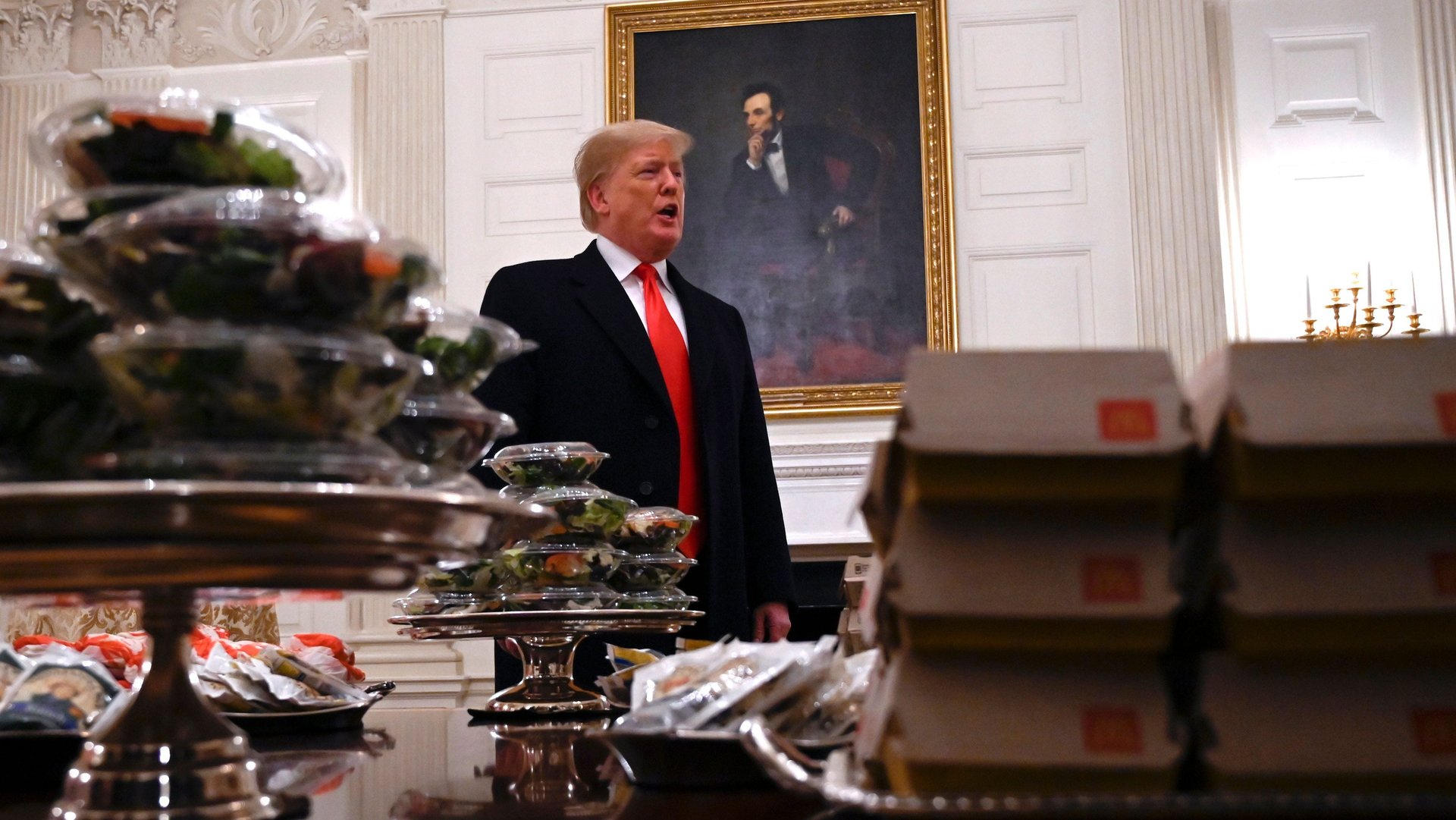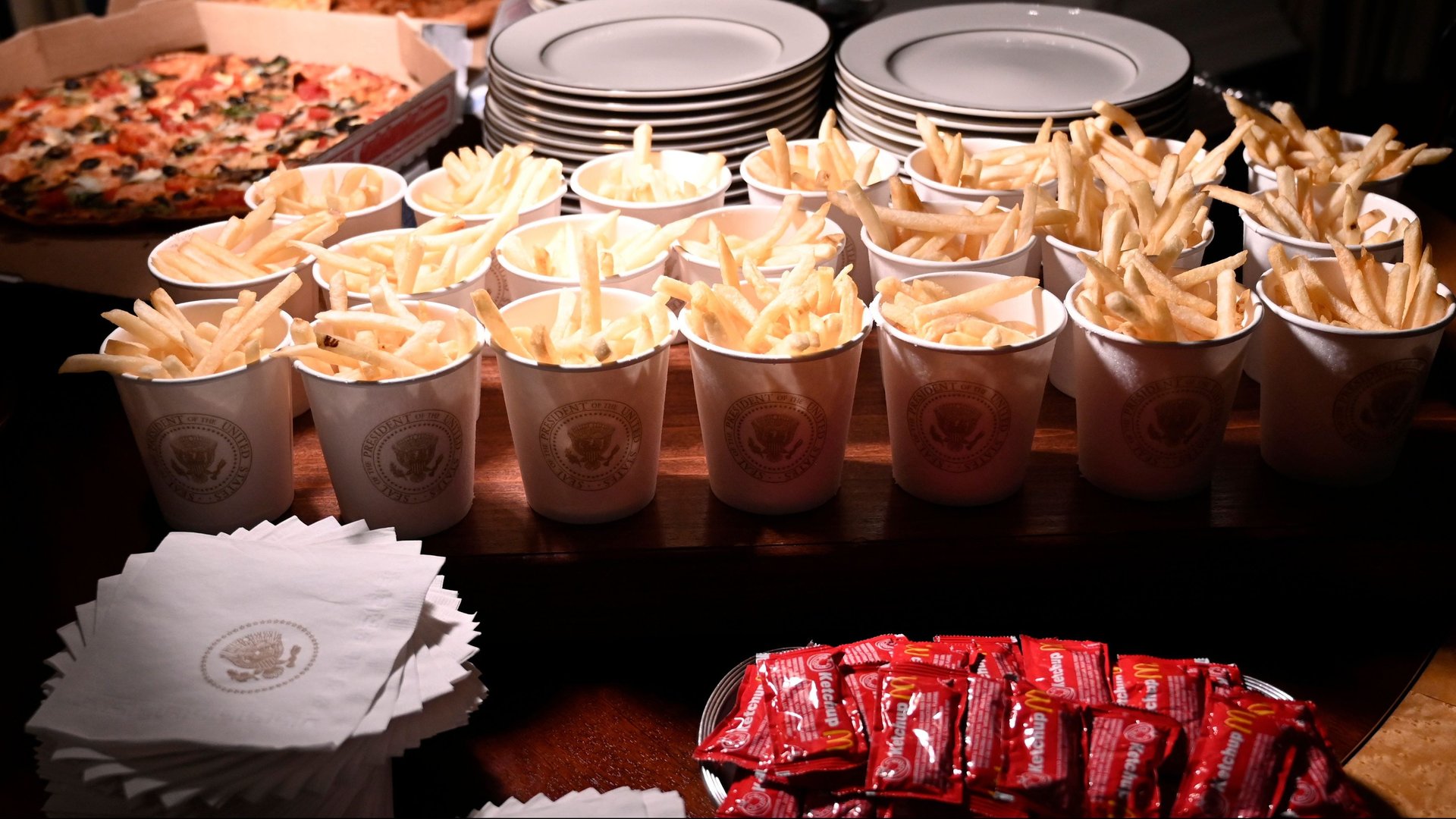What America hears when the press makes fun of the way Trump eats
In case you missed it, this week President Donald Trump welcomed the Clemson Tigers football team to the White House to celebrate its recent college championship win with a fast food feast. Stacks of paper-wrapped burgers and cardboard McNugget boats sat piled on silver platters, nestled next to ornate gold candelabras in the State Dining Room, as Trump beamed for the photo opportunity.


In case you missed it, this week President Donald Trump welcomed the Clemson Tigers football team to the White House to celebrate its recent college championship win with a fast food feast. Stacks of paper-wrapped burgers and cardboard McNugget boats sat piled on silver platters, nestled next to ornate gold candelabras in the State Dining Room, as Trump beamed for the photo opportunity.
The media had a collective freakout. CNBC posted a breathless editorial about how elite athletes are especially vulnerable to hypertrophic cardiomyopathy. The Atlantic described the event as, “A little bit P. T. Barnum, a little bit Hieronymus Bosch, a little bit Beauty and the Beast, had ‘Be Our Guest’ been staged by Willy Wonka and also set in the apocalypse.”
And indeed, there was some major cognitive dissonance in fast food being plated by white-gloved White House staff. But was this style of hospitality such a horror? Arguably, burgers and fries are more celebratory than the usual passed appetizers, and honeydew-heavy fruit plates that pass for normal at formal affairs. And for a lot of diners, in the US and beyond, a meal from a fast food restaurant is a special treat.
What’s more, all this hand-wringing and hyperbole over how terrible it is to serve a Big Mac within 10 yards of a portrait of Abraham Lincoln sends a clear message: If you like this food, if you think this sounds fun, and nice, and a little special, you are trash. It’s elitist and it’s shaming.

Food is personal and celebration food is especially personal. When we start to point fingers and say, about someone else’s special favorite, “You’re doing it wrong,” it’s just moralizing dressed up as cultural critique. Analyzing Trump’s motivations is a never-ending hall of mirrors, but his straightforward love of specific foods is knowable. Trump likes steak, well done. He enjoys ketchup as a condiment. He appreciates chocolate cake and burrito bowls and Filet-O-Fish sandwiches. His mother’s meatloaf is on the menu at Mar-a-Lago.
When pundits, political critics, and the media take aim at Trump’s gustatory preferences, making fun of the faux fanciness of the menu at the Trump Grill, or eye-rolling on Twitter about his Pumpkin Spice Latte palate, it tells everyone who shares those tastes that the things they like are crass, gauche, basic. Policy isn’t the problem, it says. What matters is a shared aesthetic identity, a club—and to be a member you have to prefer kale salads and avocado toast to McChickens and fries.
In The New Yorker, Helen Rosner argues that the banality of Trump’s choice of fast food was the issue, not the fact that it was fast food. And she’s right that it probably could have been more delicious. Fried chicken and pizza both stay tastier longer at room temperature than burgers and fries. “[S]erving a meal of fast food at a fancy gathering is not inherently a bad idea,” Rosner writes. “In fact, it can be wonderful. A few dozen wings and thighs from Popeyes or a Chick-fil-A nugget tray make for a festive dinner-party centerpiece. Shake Shack-catered weddings are all over Pinterest.”
But in these sentences are the equivalent of a secret handshake. You almost got it right, they say. How sad. If only you’d ordered Shake Shack instead of sending the secret service to the McDonald’s drive-through. If only you’d chosen something with kitsch-factor, like In-and-Out, or Popeyes, instead of the irony-deficient flavors of Wendy’s. Chowing down on Shake Shack is cool (New Yorkers wait in line for these burgers!). Eating a pile of Burger King food is just gross. Of course, Whopper-lovers hear this coded message for what it is—an excuse to make fun of things they like.
It’s not just that the media comes across as a pack of mean girls by obsessing over Trump’s fast food bonanza. They also missed the coded message that Trump himself was sending to his supporters—and ultimately, they got played by his mastery of spectacle. As furloughed workers contend with a fourth week without a paycheck in Trump’s government shutdown, the president used the fast food frenzy as a photo op, a ready-made meme that sends a very specific message, as Megan Garber wrote in The Atlantic:
The viral images of Trump and his McFeast allege, in spite of so much evidence to the contrary, that a functioning government is not fully necessary; the only thing Americans really need, the Quarter Pounders whisper, is Trump himself. He is both the strict father of political discourse and the generous father of ancient myth, capable of providing the American family with the 21st century’s version of the fatted calf. He is all you—all we—require. I alone can fix it.
Restaurateurs and celebrities from Ayesha Curry to Michael Strahan to Nick Kokonas, co-owner of Chicago’s temple of molecular gastronomy temple Alinea have all said that they’d like to treat the Clemson Tigers to a “properly” celebratory meal. These are probably kind gestures. But they also assume that treating these college students to a pile of burgers somehow under-recognized their athletic skills.
It’s worth remembering that not everyone’s first instinct when celebrating a milestone is to reach for the lobster bibs. Sometimes a Quarter Pounder with extra pickles can mean the same thing. The Tigers won a football game—let them celebrate with Super Bowl food.